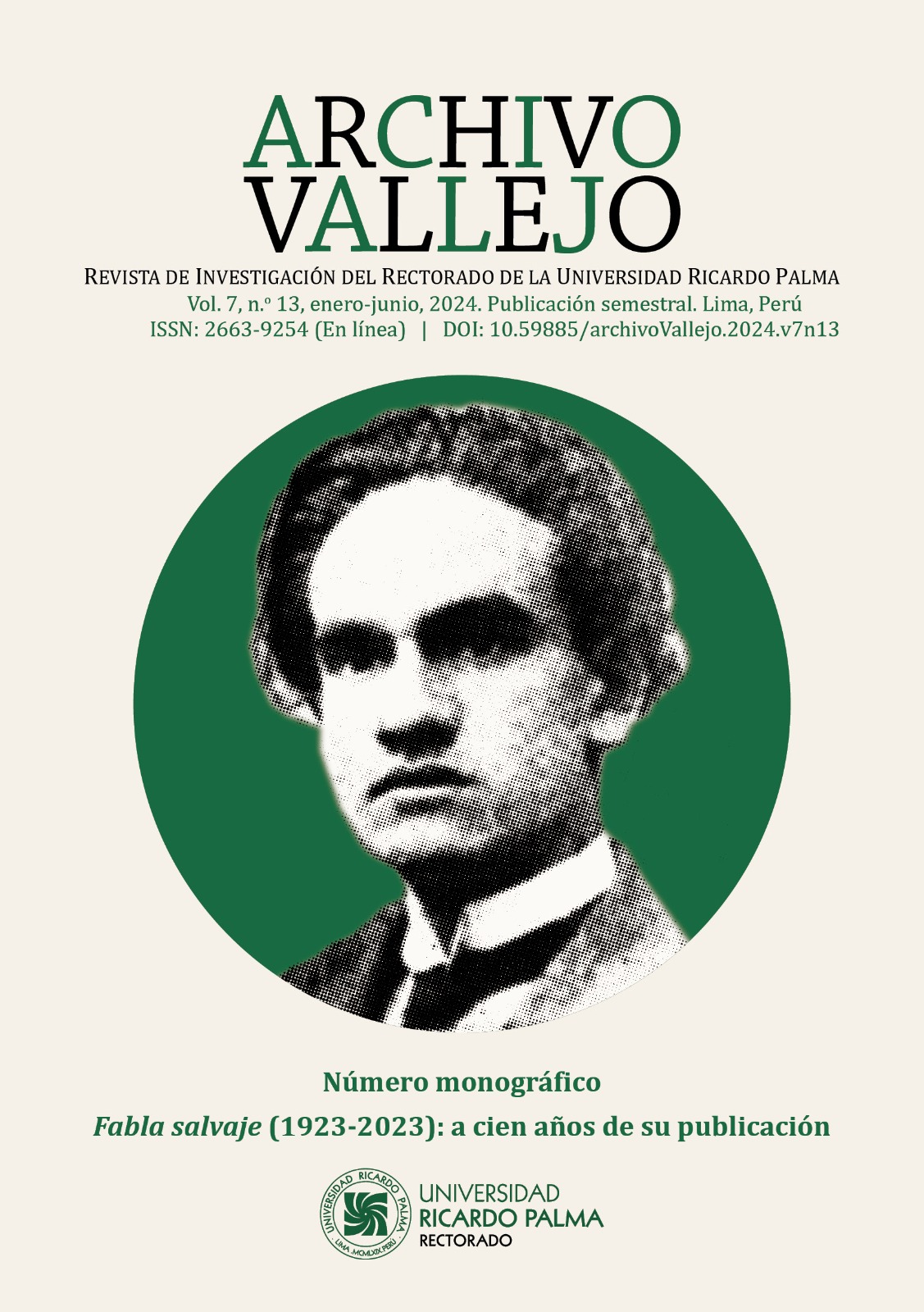The one and the multiple. The arrival of modernity in the Andes: a reading of César Vallejo’s Fabla salvaje (1923)
DOI:
https://doi.org/10.59885/archivoVallejo.2024.v7n13.05Keywords:
César Vallejo, Fabla salvaje, modernity, Andean world, multiplicityAbstract
This research postulates that Fabla salvaje (1923), a novel by César Vallejo, represents an epistemic violence that marks the full entry of modern subjectivity into the Andean world. The novel proposes, then, how modernity, through the dynamics of isolation and denial of dialogue, penetrates in the calm of the Andean world and breaks the prerogatives of the family or animal horizontality by rendering them strange and useless. This phenomenon is represented in Balta Espinar, the protagonist of the novel, as well as in his relations with his wife and with the nature that surrounds him. In order to demonstrate this hypothesis, the contributions of the French philosophers Gilles Deleuze and Félix Guattari will be used. The aim is to show how the novel narrates the distancing from the multiplicity of the surrounding life and the concentration on the unity of the subject. The transition from the multiple to the unique leads, finally, to the annihilation of the protagonist.
References
Deleuze, G. y Guattari, F. (1974). El anti-Edipo. Capitalismo y esquizofrenia. El Corregidor.
Deleuze, G. y Guattari, F. (2020). Mil mesetas. Capitalismo y esquizofrenia. Pre¬Textos.
Levinas, E. (2016). Totalidad e infinito. Ediciones Sígueme.
López, C. A. (2023). Una lectura arqueológica sobre la (im)pertinencia de la vanguardia y el surrealismo en el plan estético de Gamaliel Churata. Escritura y Pensamiento, 22(46), 157¬180. https://doi.org/10.15381/escrypensam.v22i46.25198
Mazzotti, J. A. (2021). Introducción. Fabla salvaje o «el otro yo» de la peruanidad. En C. Vallejo, Fabla salvaje (pp. 5¬33). Fondo Editorial de la Universidad César Vallejo.
Mudarra, A. (2019). La figuración lírica como mecanismo de representación en Fabla salvaje, de César Vallejo. Archivo Vallejo, 2(3), 83¬98. https://doi.org/10.31381/archivoVallejo.v2n3.5173
Quijano, A. (2019). Ensayos en torno a la colonialidad del poder. Ediciones del Signo.
Valenzuela, J. (2022). Subjetividad y animalidad en Fabla salvaje de César Vallejo. Anales de Literatura Hispanoamericana, (51), 149¬157. https://doi.org/10.5209/alhi.85131
Vallejo, C. (2013). Fabla salvaje. En César Vallejo, Narrativa completa (pp. 133¬167). Introducción, edición y notas de Ricardo González Vigil. Ediciones Copé.
Villafán, M. (2014). Fabla salvaje, de César Vallejo: más acá del complejo edípico. En G. Flores (ed.), Vallejo 2014. Actas del Congreso Internacional Vallejo Siempre. Tomo I (pp. 375¬400). Editorial Cátedra Vallejo.
Downloads
Published
How to Cite
Issue
Section
License
Copyright (c) 2024 Américo Mudarra Montoya

This work is licensed under a Creative Commons Attribution 4.0 International License.
Los contenidos publicados en la revista están bajo una licencia CC-BY 4.0, la cual permite:
- Compartir, copiar y redistribuir el material en cualquier medio o formato.
- Adaptar, remezclar, transformar y construir a partir del material para cualquier propósito, incluso comercialmente.
Bajo los siguientes términos:
- Atribución. Usted debe dar crédito de manera adecuada, brindar un enlace a la licencia, e indicar si se han realizado cambios. Puede hacerlo en cualquier forma razonable, pero no de forma tal que sugiera que usted o su uso tienen el apoyo de la licenciante.















